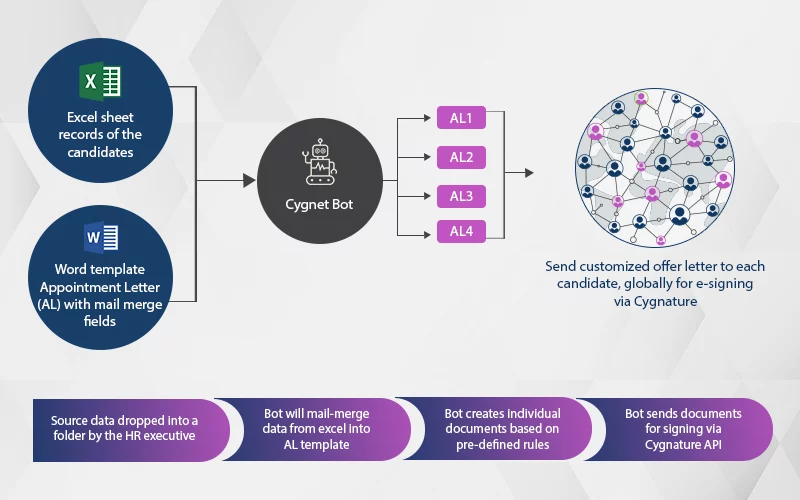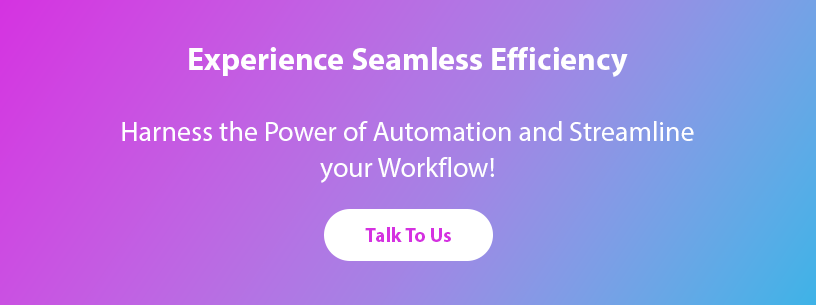RPA, or the Robotic Process Automation process is amongst the latest technologies that have completely transformed how humans work on repetitive tasks.
A survey conducted by Deloitte found that RPA is a proven and achievable solution, with more than 74% of companies and brands across the world planning to learn more about it in the next few years. It was also found that almost 22% are already piloting or incorporating RPA.
Automating HR operations and administrative tasks saves significant resources and time, which could be used more constructively in strategic planning, such as finding solutions to critical issues. This article will discuss everything you should know about RPA in HR and its benefits. RPA in HR can help to streamline processes such as recruitment, onboarding, payroll, and performance management. It can also be used to automate mundane tasks such as data entry and document management. As a result, HR teams can focus on more productive activities and increase efficiency.
What is RPA in human resources?
RPA is an efficient way of automating HR operations, which enhances human resources data management abilities. It is a software bot that automates rule-based processes in the human resource department that needs little to no human interference.
This process primarily works by letting the robot do the repetitive tasks for the Human Resource employees. These tasks might include recruiting new talent, benefits enrolment, processing payroll, and compliance reporting, which requires repetitive and manual work.
Besides the enhanced accuracy and data processing speed, RPA is instrumental in downsizing the costs for HR-related practices. Furthermore, RPA automates mundane and time-consuming tasks, thereby freeing up HR staff to focus on more strategic tasks. Additionally, RPA can improve customer service by reducing response times for inquiries related to HR processes.
RPA benefits in payroll and HR

Generally, human resources play a significant role in all organizations as they support their employees and enhance the overall environment of the workspace.
Automating HR operations makes sure that staff are doing their jobs effectively. However, the vast amount of data management, such as filing, validating, and updating records, and the constant inrush of request processing can overwhelm human resource managers.
Using human resource automation, companies can compress workday procedures by automating monotonous tasks and allow managers to emphasize strategic and productive jobs for the company’s growth. The primary focus of hyperautomation in HR operations is on tasks which were previously inaccessible via other extensive legacy systems

Here are a few of the benefits of RPA in the workforce environment:
Enhanced productivity and accuracy
RPA brings enhanced productivity and accuracy to HR by leveraging pre-coded technology. With automated processes, RPAs significantly reduce the likelihood of errors in repetitive tasks like data entry, employee onboarding, and payroll processing. By taking over these mundane responsibilities, RPAs free up HR employees to focus on more critical and strategic assignments, fostering increased productivity. This technology streamlines workflows, enabling HR professionals to allocate their time and efforts towards urgent or preparatory tasks. As a result, the overall goals of the company are better supported, leading to improved productivity across the organization. By minimizing errors, optimizing workflows, and empowering HR staff, RPA proves to be an asset in driving efficiency, accuracy, and success in HR operations.
Refined scalability
Scalability is a key benefit of RPA in transforming routine HR operations. With RPA, companies can effortlessly adjust their automation efforts based on demand, resulting in cost-effective operations. Whether scaling up during peak periods, such as recruitment drives, or scaling down during lean periods, RPA ensures optimal resource utilization. This flexibility minimizes wastage of time and effort, allowing HR departments to efficiently manage their workload. By seamlessly adapting to changing needs, RPA empowers organizations to streamline HR processes, improve efficiency, and achieve maximum productivity.
Improved flexibility
Flexibility is a key aspect of RPA’s transformative impact on routine HR operations. RPA solutions exhibit high adaptability, enabling them to operate effectively in diverse deployment environments. Whether integrated with existing HR systems or implemented as standalone tools, RPAs can seamlessly follow programmed processes. This versatility empowers HR departments to automate a wide range of tasks, from data entry to employee onboarding, without significant changes to their existing infrastructure. The flexibility of RPA allows HR professionals to tailor automation to their specific needs, enhancing operational efficiency and enabling a smooth transition to a more streamlined and digitally driven HR ecosystem.
Reliability
Reliability is a crucial aspect of RPA’s transformative impact on routine HR operations. By minimizing human interference and absence, RPA ensures uninterrupted efficiency and productivity. Unlike human employees, RPA bots can work tirelessly 24/7, reducing processing time and eliminating delays in HR processes. This round-the-clock availability enhances reliability in task completion, ensuring consistent and timely execution of critical HR operations. With RPA’s reliability, organizations can achieve faster turnaround times, meet deadlines, and maintain a high level of service quality. The dependable nature of RPA in HR operations contributes to increased efficiency, improved customer satisfaction, and overall organizational success.
Enhanced data security
Data security is a significant benefit of RPA in transforming routine HR operations. RPA ensures enhanced data security by employing various measures such as encryption, access controls, and automated compliance checks. Sensitive HR data, including employee personal information, payroll details, and performance records, are safeguarded through encryption, making it inaccessible to unauthorized individuals. Access controls limit data access to authorized personnel, reducing the risk of data breaches. RPA also performs automated compliance checks, ensuring adherence to data protection regulations and minimizing the chance of non-compliance. By prioritizing data security, RPA instils confidence in HR operations, protecting valuable information and maintaining the privacy and trust of employees and stakeholders.
Conclusion
The RPA industry is expected to grow and be worth $30.85 billion by 2030 and is at an inflection point where, in the next few years, companies and businesses are bound to consider the advantages of RPA and implement it for business transformation.
By saving humans from repetitive tasks through this technology, automating HR operations will encourage better productivity and help businesses get an edge over their competitors.
Let Cygnet Digital be your technology partner in growth and innovation. Reach out to us today!










